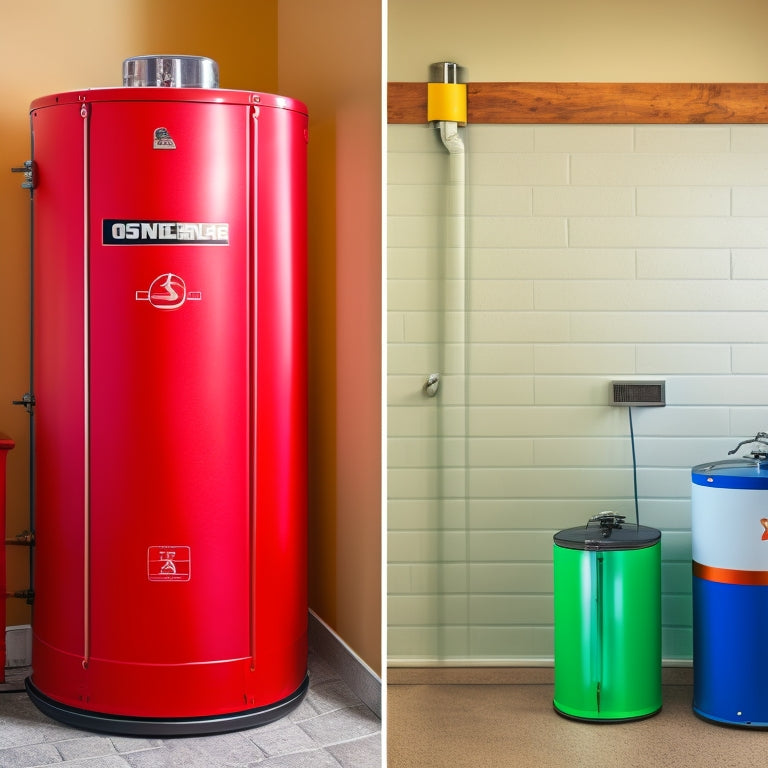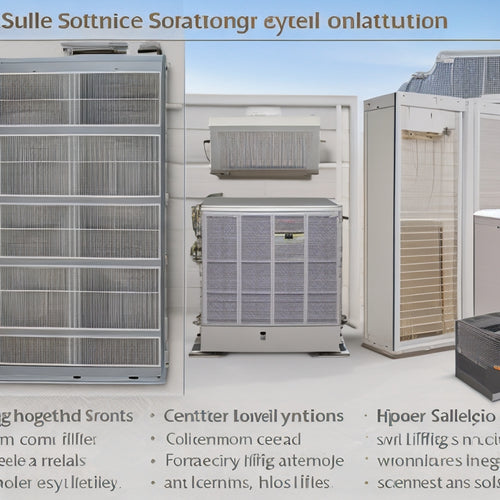
Why Consider Heat Pump Water Heater Incentives Now?
Share
You're eligible for hundreds of dollars in federal tax credits, state rebates, and utility company incentives just for switching to a heat pump water heater, making now an opportune time to upgrade your energy-guzzling traditional water heater. With federal tax credits up to $300, state rebates up to $1,000, and utility company incentives ranging from $300 to $1,000, you can greatly reduce your upfront costs. Additionally, heat pump water heaters operate with higher efficiency, leading to lower energy bills and a reduced carbon footprint. By taking advantage of these incentives now, you'll not only save money but also contribute to a sustainable future - and there's more to investigate about the benefits of making the switch.
Key Takeaways
- Federal tax credits of up to $300 and state-level rebates are available for heat pump water heater installations, reducing upfront costs.
- Limited time offers and expiring incentives, such as federal tax credits ending in 2025, create a sense of urgency to act quickly.
- Heat pump water heaters provide long-term cost savings through reduced energy consumption, lower maintenance, and extended lifespan.
- Installing heat pump water heaters can increase property value and resale value, making it a financially sound decision.
- Combining federal, state, and utility company incentives can maximize savings and make heat pump water heater adoption more affordable.
Federal Tax Credits Available
You can claim a federal tax credit of up to $300 for purchasing and installing a heat pump water heater that meets certain energy efficiency standards.
In addition, integrating clean energy solutions, such as solar panel charging, can lead to significant cost savings and a reduced carbon footprint.
To qualify, the heat pump water heater must have an Energy Factor of at least 2.0, and you must have installed it in your primary residence in the United States.
You'll need to keep records of the purchase and installation, including the manufacturer's certification statement, to prove tax credit eligibility.
The application process involves completing Form 5695 and attaching the required documentation to your tax return.
State-Level Rebate Programs
You'll find that several states offer rebate programs for heat pump water heaters, with California taking the lead regarding incentives offered.
Federal incentives, such as tax credits and grants, can also be combined with state and local incentives, amplifying financial appeal for heat pump water heater adoption.
California's program provides rebates of up to $1,000 for qualified heat pump water heaters, making it an attractive option for homeowners.
New York also offers a rebate program, with incentives ranging from $300 to $500, depending on the efficiency of the unit.
California Leads the Way
California has taken the lead in promoting heat pump water heater adoption through its state-level rebate programs.
You're likely familiar with the state's ambitious climate action goals, which aim to reduce greenhouse gas emissions by 40% by 2030. To achieve this, California has implemented various renewable energy initiatives, including rebate programs for heat pump water heaters.
For instance, the state's emphasis on green hydrogen fuel cells and other alternative fuels has paved the way for innovative solutions like heat pump water heaters.
Effective incentive programs that encourage consumers to adopt energy-efficient technologies, consumer awareness campaigns that educate residents on the benefits of heat pump water heaters, local government support for installation challenges and technology adoption rates, and community outreach efforts to promote market trends and drive demand for heat pump water heaters.
New York Offers More
Three states, including New York, have followed California's lead in implementing state-level rebate programs to encourage the adoption of heat pump water heaters.
You're likely to benefit from these incentives if you're planning home upgrades that support the energy shift. Additionally, as you consider eco-friendly upgrades, it's important to investigate the federal tax credits available for new, previously-owned, and commercial clean vehicle purchases, which can further support your sustainable lifestyle.
New York's rebate program, offered by the New York State Energy Research and Development Authority (NYSERDA), provides up to $1,000 for the installation of a heat pump water heater.
Additionally, you may be eligible for a further $500 rebate if you're a low-to-moderate income homeowner.
These incentives can help offset the higher upfront cost of heat pump water heaters, making them a more accessible option for your home upgrades.
Utility Company Incentives Offered
Many utility companies recognize the energy efficiency benefits of heat pump water heaters and offer incentives to encourage their adoption. You can take advantage of these incentives, which often come in the form of rebates or discounts, to reduce the upfront cost of purchasing and installing a heat pump water heater.
For instance, some commercial installations can benefit from federal grants and state rebates, greatly reducing initial investment costs.
Similarly, utility companies offer:
- Rebates ranging from $300 to $1,000 for residential customers
- Discounts on the purchase of heat pump water heaters
- Special financing options or low-interest loans for customers who want to upgrade to a heat pump water heater
- Partnerships with local contractors to provide additional incentives and promotions
Lowering Your Energy Bills
By investing in a heat pump water heater, you'll not only benefit from utility company incentives but also enjoy significant savings on your energy bills.
This is because heat pump water heaters operate at a higher efficiency than traditional electric resistance water heaters, reducing your energy consumption.
In fact, heat pump water heaters can be up to 3.5 times more efficient, which translates to lower energy bills.
When you compare the costs, you'll find that heat pump water heaters can save you hundreds of dollars per year.
This cost comparison makes it clear that investing in a heat pump water heater is a smart financial decision, giving you more freedom to allocate your resources as you see fit.
Environmental Benefits Explained
As you consider investing in a heat pump water heater, you're likely wondering about the environmental benefits beyond the financial savings.
By choosing a heat pump water heater, you'll be contributing to a more sustainable future. Here's how:
-
Reduce greenhouse gas emissions: Heat pump water heaters are highly efficient and produce considerably fewer emissions than traditional water heaters, resulting in a substantial reduction in greenhouse gas emissions.
-
Lower your carbon footprint: By using heat pump technology, you'll decrease your reliance on fossil fuels and minimize your impact on the environment.
-
Conserve natural resources: Heat pump water heaters use advanced technology to utilize renewable energy from the air, reducing the demand on natural resources.
- Support a sustainable future: By investing in a heat pump water heater, you're investing in a more sustainable future for generations to come, with a reduced sustainability impact.
Increased Property Value
By installing a heat pump water heater, you're not only reducing your energy consumption, but you're also elevating your property's value.
This energy-efficient upgrade can increase your home's resale value, making it more attractive to potential buyers.
Additionally, the long-term cost savings from reduced energy bills can further enhance your property's appeal.
Energy Efficiency Boost
A heat pump water heater's energy efficiency can be a major selling point for homeowners, greatly enhancing their property's value.
When you invest in a heat pump water heater, you're not only reducing your energy bills, but you're also increasing your property's appeal to potential buyers who value energy performance and climate adaptability.
Some benefits of heat pump water heaters include:
- Energy efficiency ratings up to 3.5 times higher than traditional water heaters
- Lower greenhouse gas emissions, making them a more environmentally friendly option
- Ability to provide both hot water and space heating, increasing overall energy performance
- Potential to integrate with renewable energy systems, such as solar panels, for even greater climate adaptability
Higher Resale Value
Investing in a heat pump water heater can greatly enhance your property's resale value, making it a smart move for homeowners looking to sell in the future.
You'll be attractive to environmentally conscious buyers who value energy-efficient home upgrades. A heat pump water heater is a desirable feature that adds significant resale appeal, setting your property apart from others on the market.
By installing one, you're not only reducing your carbon footprint but also increasing your property's value. This upgrade can be a major selling point, especially for buyers who prioritize sustainability and energy efficiency.
With a heat pump water heater, you can confidently list your property at a higher price, knowing it'll appeal to a wider range of buyers.
Long-Term Cost Savings
Heat pump water heaters offer a significant advantage when it comes to long-term cost savings, which can further increase your property's value.
By choosing a heat pump water heater, you can enjoy reduced energy consumption and lower utility bills. Additionally, these systems require less maintenance, resulting in lower maintenance costs over time.
Some key benefits of heat pump water heaters include:
- Lower operating costs due to high efficiency ratings
- Extended lifespan compared to traditional water heaters
- Opportunities for technology advancements and future upgrades
- Potential for increased property value due to modern, eco-friendly appliances
Heat Pump Technology Advantages
Since the 1970s, when heat pump technology first emerged, it has undergone significant advancements, developing into a highly efficient and environmentally friendly solution for water heating.
You can now benefit from heat pump efficiency, which is up to 4 times higher than traditional electric water heaters. This means you'll use less energy to heat water, reducing your carbon footprint and reliance on non-renewable energy sources.
Heat pumps also utilize renewable energy from the air, providing a sustainable solution for your water heating needs.
Saving Money on Installation
You can greatly reduce your upfront costs by taking advantage of available incentives for installing a heat pump water heater. This can greatly impact your cost comparison, making the installation process more affordable.
Some incentives to evaluate:
- Rebates from utility companies and government agencies
- Tax credits for energy-efficient upgrades
- Low-interest loans or financing options
- State and local incentives for sustainable energy installations
Limited Time Offer Alerts
Several limited time offer alerts can be a breakthrough in your pursuit of a heat pump water heater. These offers can provide additional savings on top of existing incentives, making your purchase even more affordable. Be sure to act quickly, as these offers are typically only valid for a limited time.
| Offer | Expiration |
|---|---|
| Utility Rebate | 3/31/2023 |
| Manufacturer Discount | 6/30/2023 |
| State Tax Credit | 12/31/2023 |
| Federal Incentive | 12/31/2025 |
Don't let these opportunities slip away. Mark your calendar and plan accordingly to take advantage of these limited time offers before they expire. Remember, combining these offers with existing incentives can greatly reduce the upfront cost of your heat pump water heater.
Frequently Asked Questions
Can Heat Pump Water Heaters Be Installed in Existing Homes?
Like a phoenix rising from the ashes, you can revamp your existing home with a heat pump water heater, overcoming installation challenges, and reaping significant energy savings, all while embracing the freedom to reduce your carbon footprint.
Do Heat Pumps Work Efficiently in Cold Climates?
You'll find that heat pumps surprisingly work efficiently in cold climates, thanks to advanced designs that optimize cold weather performance, maintaining energy efficiency even in freezing temperatures, ensuring you're free to enjoy hot water without worrying about the chill outside.
Are Heat Pump Water Heaters Suitable for Large Families?
You'll be surprised to know that a single heat pump water heater can supply up to 4.5 gallons of hot water per minute; for large families, consider multiple units, ensuring energy efficiency, ample hot water, and long-term savings while minimizing space requirements and installation costs.
Can I Install a Heat Pump Water Heater Myself?
You can attempt a DIY installation, but be aware of safety considerations, such as electrical and refrigerant handling, to avoid risks; it's recommended to hire a licensed professional to guarantee a safe and efficient heat pump water heater setup.
How Long Does a Heat Pump Water Heater Typically Last?
You're "burning the midnight oil" to learn about heat pump water heaters! Typically, they last 10-15 years, but with regular maintenance and lifecycle considerations, you can extend their lifespan, ensuring you're not left high and dry when it matters most.
Related Posts
-

Why Solar HVAC Filters Revolutionize Home Energy Efficiency
By adopting solar HVAC filters, you're shifting your home's energy reliance from fossil fuels to clean, renewable sou...
-

What Do Power Strips Do for Standby Energy?
You're likely aware that your devices, such as TVs and computers, continue to draw power even when turned off, a phen...
-

10 Eco-Friendly Air Management Tools for Clean Home Living
You're taking an essential step towards creating a healthier living space by seeking eco-friendly air management tool...


